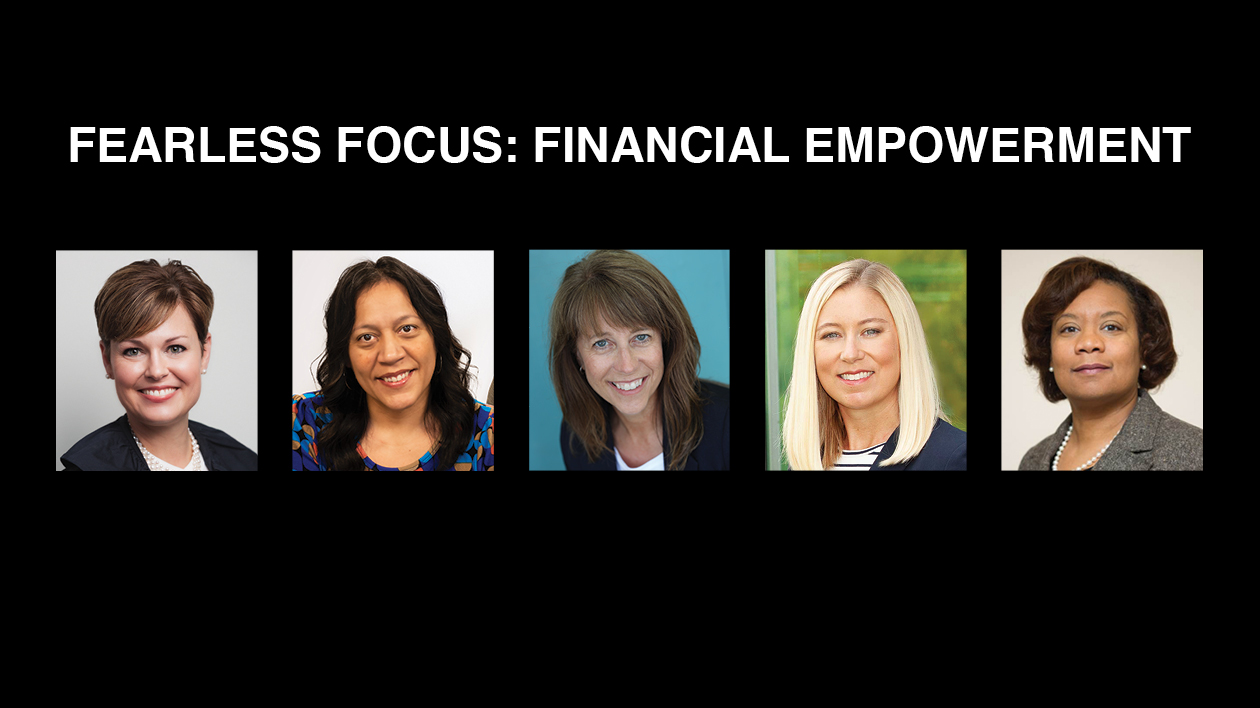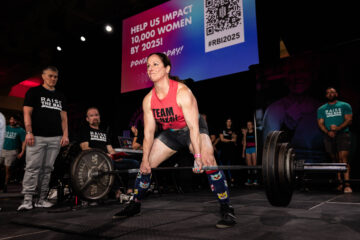Preview: Fearless Focus to concentrate on financial empowerment

Event details:
Thursday, April 18 | Noon to 1 p.m. | Virtual | Register for free
Wage disparities and differing policies on paid family leave continue to be systemic issues affecting women’s economic standing. On an individual level, women often feel less confident than men when it comes to budgeting, investing and planning for retirement.
In our first Fearless Focus virtual event of 2024, we will talk about both the systemic and individual challenges women face financially. Leaders will highlight programs, opportunities and policies that support women’s economic mobility.
Registration is free, so we hope you will sign up and encourage others to do the same. Since starting Fearless, we’ve heard from so many audience members about how uplifting these events have been for them – some have said that they would have their daughters watch the recording, and others have hosted watch parties over the lunch hour at their companies. These are the highest compliments we can receive, because our goal with Fearless is simple: We want to empower Iowa women to succeed in work and life.
Meet our speakers
Ahead of the event, we asked each speaker to tell us about one financial barrier that adversely affects women and how they think the business community plays a role in addressing it. Here’s what they said.
Kara Hoogensen, senior vice president and head of workplace benefits – benefits and protection, Principal Financial Group:
The 2023 Global Financial Inclusion Index consumer sentiment research from Principal Financial Group showed that women report they have less access to financial products, tools, services and safeguards than men. There is an opportunity for business leaders, particularly those in financial services, to rethink and recommit to how we support women in the workplace, facilitating greater access to the resources they need to achieve financial security and build wealth. If we don’t, we risk widening the financial inclusion gap and losing the full potential of the talent we need to grow our businesses. Additionally, we shouldn’t lose sight of the fact women are poised to play a major role in the greatest wealth transfer ever. The need is clear – government, employers and financial services institutions must work together, like on income-protected leave, to achieve gender equity while combating issues such as rising child care costs and the persistent wage gap.
Marcie Ordaz, executive director, Lift Women’s Foundation:
Over the years, I have been able to attend learning sessions focusing on women’s empowerment. I thought I had heard all the inequalities women face when addressing financial barriers in and out of the workplace. It wasn’t until I attended a speed session facilitated by financial expert and friend Catherine Dittmer, financial adviser with Merrill Wealth Management, and learned about the staggering numbers on the amount of retirement funds women lose out on compared to men. Every day, women are deciding to start a family with their spouse or partner, and though many times a mutual agreement, it is the women that are out of work for longer leave time to both be a caregiver and to recover. During this time, employer contributions are sometimes reduced or ceased altogether. If the women have to take an extended leave beyond what is normal, the loss of retirement contributions is even greater. A woman who is in a long-term relationship beyond retirement may not feel the impact. However, women that depend solely on their single retirement account will have to work longer to compensate for lost retirement contributions and employer matches.
The business community has to take time to address this inequality. It is acknowledged by the U.S. Department of Labor that the impact of caregiving on a mother’s wages reduces lifetime earnings by at least 15%, averaging $295,000 in unpaid care averages. If this is just the wages, the lost benefits would make that total even higher. If there are programs to address short- and long-term disabilities, there should be programs that support retirement matching during extended leaves. Outside of the workplace, those that choose, or are forced, to be in long-term caregiving roles for their family members are not compensated for being a stay-at-home caregiver, nor do they have the chance to earn matched contributions from an external source. I believe the business community has to play a role in supporting the women that they employ that have to take an extended leave. And, as a nation, we have to figure out how to support the women that work within their homes, not earning income for 401(k) investment and match opportunities.
Sonya Sellmeyer, consumer advocate, Iowa Insurance Division:
A PwC survey conducted in January 2023 found that 56% of workers spent three or more hours per week dealing with or worrying about their personal finances. Knowledge is power, and women fall behind men in financial literacy. In a 2020 survey done by the Iowa Department of Insurance and Financial Services (DIFS), Iowa women reported they wanted to learn more about retirement planning and investments. Younger women and women from lower-income households also requested more education and guidance regarding budgeting and debt management.
Employers offering an empowering and confidential financial wellness program as an employee benefit may be a solution, but the programs will need to be tailored to meet the particular challenges faced by women. Financial education with coaching, webinars and online tools may provide flexibility for different learning styles. Financial wellness translates to the workplace with healthier, happier and more productive employees.
Ashlee Vieregger, senior lead adviser, Foster Group:
It’s all about earnings. Women are still paid less than men. Women are also overrepresented in low-wage occupations. And women continue to experience a “broken rung” in the career ladder between entry-level and manager roles. A decade of research by McKinsey & Co. has identified a leaky talent pipeline at every level of professional advancement for women, and it is especially pronounced for women of color. The business community can help women thrive financially in two ways. First: Fix the “broken rung” and continue to promote women in equal proportion to men. Second: Continue to invest in career advancement programs specifically tailored to women and especially women of color.
Michele Williams, associate professor, management and entrepreneurship, University of Iowa Tippie College of Business:
The gender wage gap is one of the financial barriers that adversely affects women. The business community can play an important role in addressing this gap. Helpful actions include 1. making salary information readily available and easily accessible; 2. not asking employees what they were paid in their last position — a question that is against the law in some states; and 3. offering online salary negotiation training to job candidates. Negotiating is important for all job candidates, but new employees who did not major in business are often unaware that a gender wage gap exists and, furthermore, that negotiating can significantly increase their compensation package both when they start their careers and with each promotion.
This event is part of the Business Record’s Fearless initiative, which is a multiplatform initiative with women-centered content, events and media designed to help women and the companies and allies who both value and support them.
Through the Fearless Focus event series, we give you the opportunity to learn from and connect with others around the state equally as passionate about these issues. Women, gender-nonconforming individuals and male allies are all encouraged to be fearless with us.


